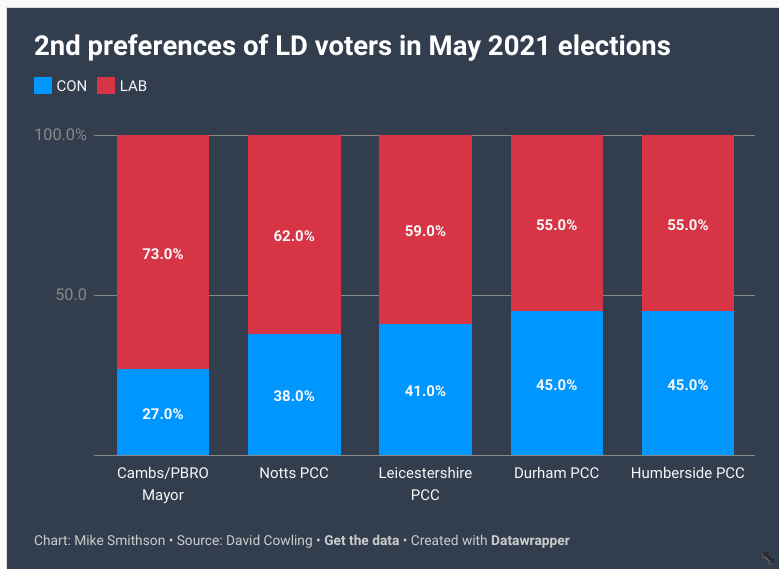The widespread notion that LAB can automatically assume 2nd prefs of LDs is not supported by real life elections

Inevitably after outcomes like yesterday’s by-election there are calls for a progressive alliance of some sort to be created whereby there is an arrangement so that the two of Lib Dem, Green or Labour parties in a specific seat stand aside so that the vote of the “progressive” can be maximised. This is the way it is argued that the FPTP system does not always work best for the Tories.
The only problem is that this assumes that LD voters would automatically make LAB their second preference. This is not necessarily the case as can be shown by what happened in real live results in elections where a second preference was possible from the May 6th group of elections.
Thanks to research by former BBC Head of Political Research, David Cowling, there were only five elections on that day which were contested by Labour, the Conservatives and the Lib Dems. These are featured in the chart above.
Firstly a large number of voters in these elections did not opt to use their second preference but of those who did the Cowling analysis finds the above splits. The Cambs/PBRO mayor had the smallest proportion of LD voters not going for LAB as their second choice – 25%.. Then, moving up the scale it was 38% in the Notts PCC election and more than 40% in the other three elections.
The way the Chesham & Amersham by-election played out shows that voters themselves who might support another party went for the LDs who established themselves as the main viable alternative. This was helped, of course, by what happened there at GE2019.
Mike Smithson
UPDATE: These are the markeThis market relates to whether the UK government re-introduces any legally enforceable restrictions on social contact in England related to the spread of coronavirus, following the legal end of restrictions on social contact (currently expected to take place on 19 July 2021). Examples may include, but are not limited to, the mandatory wearing of face masks on public transport or the closure of pubs/nightclubs. For the purposes of this market, restrictions will not include any regulations on international travel or any regulations related to self-isolation or quarantine. For the purposes of this market, ‘re-introduce’ does not require any restrictions to exactly replicate previous restrictions. If the UK government does not end restrictions on social contact in 2021, and thus could not ‘re-introduce’ restrictions, this market will be void. Dates in this market relate to when any restrictions come into force in England, rather than the date on which they are announced. All times and dates in this market are in UK time. Clarification (14 July 2021): This market refers to mandatory England-wide measures introduced by the UK government. Any measures that are introduced locally or by individual companies (e.g. Transport for London only) will not count towards the settlement of this market. Clarification (6 September 2021): If ‘vaccination passports’ are required for entry to nightclubs or other events, this market will be settled for yes, so long as the measure satisfies the other conditions in the market rules, i.e. that it is mandatory, implemented by the UK government, England-wide and legally enforceable. Clarification (12 October 2021): If vaccines become mandatory for people working in care homes at any point in 2021 (https://www.gov.uk/government/publications/vaccination-of-people-working-or-deployed-in-care-homes-operational-guidance/coronavirus-covid-19-vaccination-of-people-working-or-deployed-in-care-homes-operational-guidance) this market will be settled for yes, so long as the measure satisfies the other conditions in the market rules, i.e. that it is mandatory, implemented by the UK government, England-wide and legally enforceable.